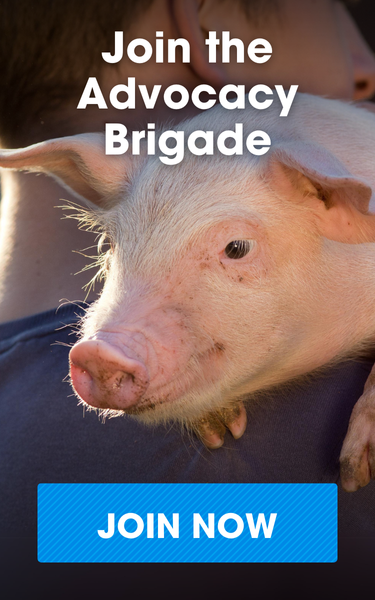
Hatching a Plan to End a Cruel Practice

The Problem: The Mass Killing of Male Chicks
While eggs are top of mind right now, did you know you’re only getting half the story behind how eggs are produced?
To provide the 90 billion eggs Americans eat each year, the egg industry must continuously hatch and raise new chicks who grow up to become egg-laying hens — that’s over 600 million chicks each year. Half of those hatched chicks are female, but the other half are male. Male chicks will never lay eggs, and as a result, they are disposed of at hatcheries in mind-bending numbers: Over 300 million newborn chicks are killed each year. This practice is usually referred to by the industry as “male chick culling,” and these baby chicks are usually gassed or ground up alive in a machine.
Why are male chicks hatched into the egg industry not raised as chickens for meat?
As farming has become more industrialized over the past five decades, chickens raised for meat, also called broiler chickens, have been bred for traits like rapid weight gain and disproportionately large breast size, which are scientifically proven to contribute to poor health and welfare outcomes in the most commonly used broiler chicken breeds. Chickens in the egg industry have been bred for a female trait only — to lay a lot of eggs — and tend to be very lean in comparison. Thus, male chicks in the egg industry cannot gain enough weight fast enough for the broiler chicken industry, so they are viewed as a valueless byproduct and are destroyed.
A Chance to Spare Millions of Chicks: More Ethical Egg Screening
In May 2024 we reported that a new, more ethical egg technology — called in-ovo sexing — could solve this problem and was being used in Europe, but not yet in the U.S. We’re excited to announce that the first machines have now been installed, soon enabling American shoppers to find eggs that don’t involve the mass killing of male chicks.
In-ovo sexing is a process of identifying which chicken embryos are male and which are female while they are still in the egg during the incubation process. This more ethical egg technology allows a hatchery to destroy male-identified embryos, ideally in the very early stages of development and well before they hatch. It can be considered a win-win for farm animals and hatchery workers, too, who no longer have to participate in the routine killing of newborn chicks.
Four Things You Need to Know to Help End the Mass Killing of Male Chicks
1. The first eggs produced using this more-ethical egg technology are expected to hit the shelves this year! Egg brand NestFresh brought the first machines that scan for male eggs versus females to the U.S. in December 2024. The first flock of male chicks were spared from cruelty, and the hatched female chicks will begin laying eggs by this summer. These eggs will be the first eggs available in the U.S. to use this new, more ethical egg tech! A second egg brand, Kipster, is likely to release eggs from more humanely hatched hens by the end of this year as well. You’ll be able to spot these two Certified Humane® egg brands at the top of our Shop With Your Heart Grocery List once these eggs hit grocery store shelves.
2. Speaking of certifications, here’s what you can look for in stores later this year … as more egg brands implement this ethical egg-screening technology to meet existing consumer demand, shoppers will want to know how to verify that their eggs were produced in a way that spared male chicks in addition to providing more humane housing conditions, like cage-free, for the hens. Certified Humane, one certification recognized by the ASPCA’s Shop With Your Heart program, has released new labeling language to do just this: “Approved Hatchery.”
3. The current bird flu crisis actually worsens the scale of the killing of male chicks. Most Americans aren’t aware that when a flock of hens is lost to bird flu, it takes 18 weeks for a replacement flock to begin producing eggs. As bird flu hits egg-laying flocks, and sadly hundreds of millions of birds are killed as a result, there will need to be an effort to rebuild flocks, meaning more baby chicks will be required. It's more urgent than ever that the industry adopts this practice to spare millions of male chicks from the grinder.
4. You can stay updated on all of the egg-citing developments by joining our Factory Farming Task Force! You’ll receive updates on how you can find these more humane eggs plus other ways you can help us build a kinder and more sustainable food system.

